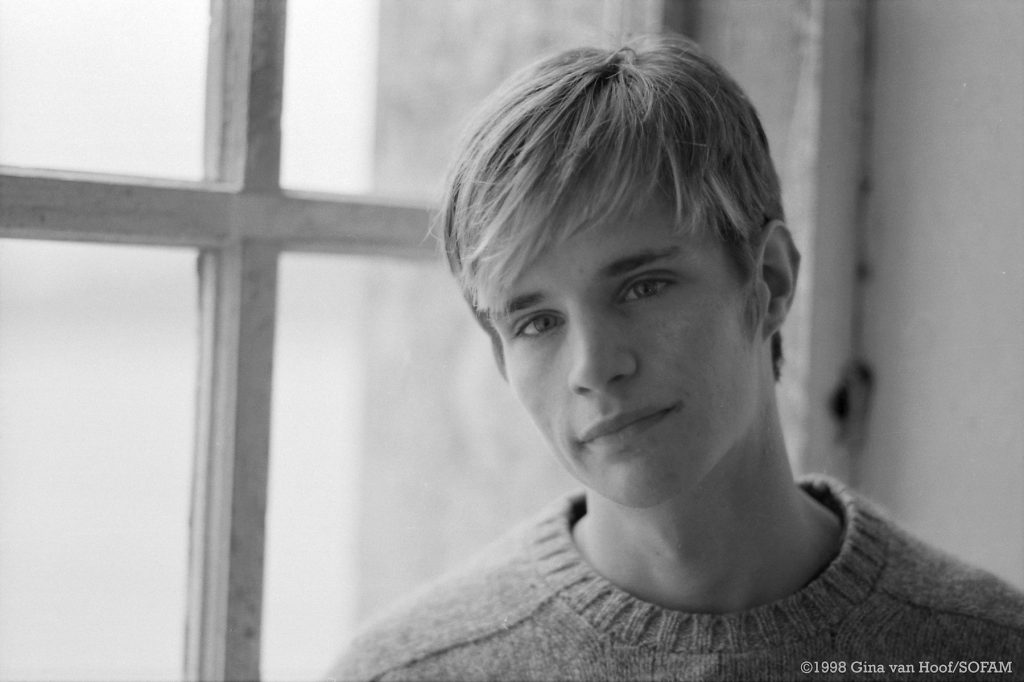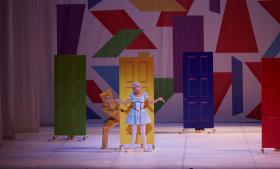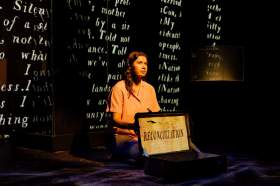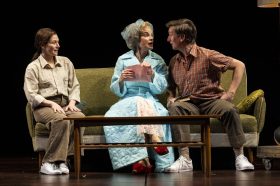Judy Shepard, the mother of 21-year-old college student Matthew Shepard, whose brutal murder in 1998 shocked the western world, does not think her son would want to be remembered as a gay martyr.
‘I don’t think he would be very happy to be regarded as a martyr. He was just a kid, a 21-year-old college student. I know I certainly would not want to be memorialised as a 21-year-old college student. He drank too much at school, he smoked too much, he didn’t go to class enough,’ Judy tells ArtsHub.
‘That’s genetic,’ her husband Dennis Shepard quips, interjecting in that familiar way that long-term couples often do.
Judy smiles, and continues: ‘But the thing that stands out about Matt, as his little brother reminds us, is that [his story] isn’t about who Matt was as a person. This is about what happened to Matt, who he is – was – and what he represented, which was people who just want to live their life like everybody else.’
On 7 October 1998, Matt Shepard, as his parents call him, was violently assaulted in a brutal homophobic attack, tied to a fence on the prairie outside Laramie, Wyoming, and left to die. Six days later, in hospital, Matt died as a result of the severe head injuries he received during the attack.
The first police officer who arrived on the scene later recalled: ‘He was covered in … partially dry blood and blood all over his head. The only place that he did not have any blood on him, on his face, was what appeared to be where he had been crying down his face.’
These words, spoken by Police Officer Reggie Fluty, along with those of many other residents of Laramie, feature in the compelling verbatim play The Laramie Project, which is being staged in a rehearsed reading at Sydney’s City Recital Hall in May.
Based on hundreds of interviews conducted in Laramie by members of the New York City-based Tectonic Theater Project, the play is a composite portrait of the impact Matt’s murder had on his friends, family and the people of Laramie – an impact that subsequently resulted in the passage of the Matthew Shepard and James Byrd Jr Hate Crimes Prevention Act, signed into law by President Barack Obama in October 2009.
The Laramie Project’s upcoming Sydney reading is presented by the American Australian Association in partnership with the US State Department, Tectonic Theater Project and the Matthew Shepard Foundation.
The reading will take place in the lead-up to the International Day Against Homophobia, Biphobia and Transphobia (IDAHOBIT) on 17 May and will be directed by Dean Bryant (Candide, A Little Night Music, Fun Home) with performers including Helpmann Award-winning actor Tony Sheldon, singer Casey Donovan and Lyndon Watts (Hamilton), with screenwriter, broadcaster and author Benjamin Law as the play’s narrator.
Law, who was only 16 when Matt Shepard died, vividly remembers the media coverage of the young man’s death.
‘It was just such a horrific act, but I think it was especially sobering at that age because I hadn’t come out yet, and it felt like a warning as to what could happen,’ Law says.
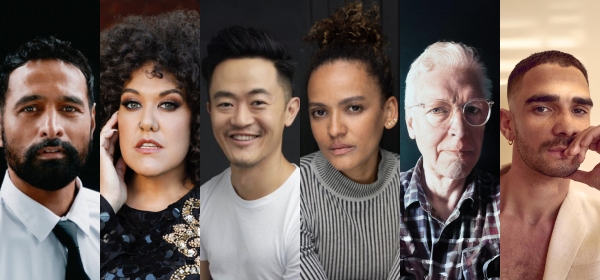
Law grew up in Queensland, which in 1991 became the last mainland Australian state to decriminalise homosexuality (Tasmania eventually followed in 1997) and his teenaged years coincided with the worst years of the HIV/AIDS crisis.
‘So there was this big proportion of my life where, you know, the adult that I was becoming was effectively criminalised by the state. And where I grew up, it was the worst thing that you could be to be gay. So then to come of age and … to have queer sex and sexuality to be synonymous with illness and death was already putting my sense of self on the backfoot,’ he explains.
While he can’t remember exactly when or how he heard about Matt Shepard’s murder, Law vividly remembers the ‘shattering effect’ it had on his 16-year-old self.
‘It just really compounded that sense that sex – queer sex specifically – will equal death, whether it’s through illness or through murder. And that really does warp your sense of safety and sexuality for a really long time,’ Law tells ArtsHub.
An iconic script
Director Dean Bryant says The Laramie Project was his introduction to verbatim theatre, and describes the play as ‘iconic’.
‘I was really fascinated that you could make a piece of theatre not out of a playwright’s head, but that you could collate real things into a dramatic shape in which all the words are what people actually said,’ he says.
The fact that the play distils such a specific and painful moment in time only adds to its status, Bryant continues.
‘The murder itself hit a particular chord in the hearts of the American public first and then spread out through the world, and even though there have been these kinds of murders since time immemorial, this one seemed to hit at a particular time where it felt like people knew more gay people – and gay people were more visible, and more proud because of the work that was done during the AIDS crisis especially,’ Bryant explains.
‘So I think for someone so young, who looked even younger than his actual years, to die in such a visceral, horrific way, I think people couldn’t let go of it.’
Benjamin Law notes that the play’s singular form also adds to its legacy and reputation. ‘I started out in writing as a non-fiction writer and as a journalist, and to know that you could do something like this and for it to be theatre, for it to be this kind of perfect marriage of documentation and journalism, theatrical work and, I don’t know, a work of justice? – that really, really took me. I’d never encountered something like that before,’ he says.
The skill with which The Laramie Project script was crafted by Moisés Kaufman and the members of Tectonic Theater Company also adds to the play’s potency, adds Bryant.
‘The fact that what Tectonic set out to do was not necessarily explore the murder, because that was well and truly documented, but to explore what was the culture in a town, in a community, before, during and in the aftermath, and how did the murder itself change what the town thought of itself? I think that’s what makes the piece itself so constantly alive to audiences… You don’t feel the hands of the creatives because [the play] feels like it has such a through line to truth.’
The play also feels remarkably generous as well as truthful, Bryant says. ‘And I think that generosity extends to the differing perspectives on the murderer and on homosexuality, and whether the town considered itself homophobic. I think that willingness to offer many perspectives, not just the liberal – in the American sense – perspective, lets the audience decide what they believe from the material that is presented to them, and that’s why it has such an impact.’
Sydney reading to have added poignancy
The Sydney reading of The Laramie Project will be made all the more poignant thanks to Dennis Shepard’s participation in the performance.
The play’s climax features the statement Dennis gave in court at the trial of Aaron McKinney, one of his son’s killers, in 1999. Reliving that moment, and speaking aloud the words he delivered in court so many years ago, ‘is hard’, Dennis says.
‘I’ve only done that once before and that was for the 20th anniversary of the play in New York City for Tectonic, and it was hard to do, because it brought up all the memories of standing there in the courtroom looking at the judge and jury and reading my court statement,’ he explains.
‘It’s going to be a little tough because it just brings back memories of Matt and brings back memories of everything surrounding [his death] – the hospital, his service, the trials, everything, even up to today. It’ll be difficult, but I’ll do like I did when I gave it originally. I’ll have a handkerchief right there so I can blow my nose and wipe my eyes because that’s what happened.’
Regarding this scene, Judy interjects quietly: ‘That’s the one part the play that is the hardest for me.’
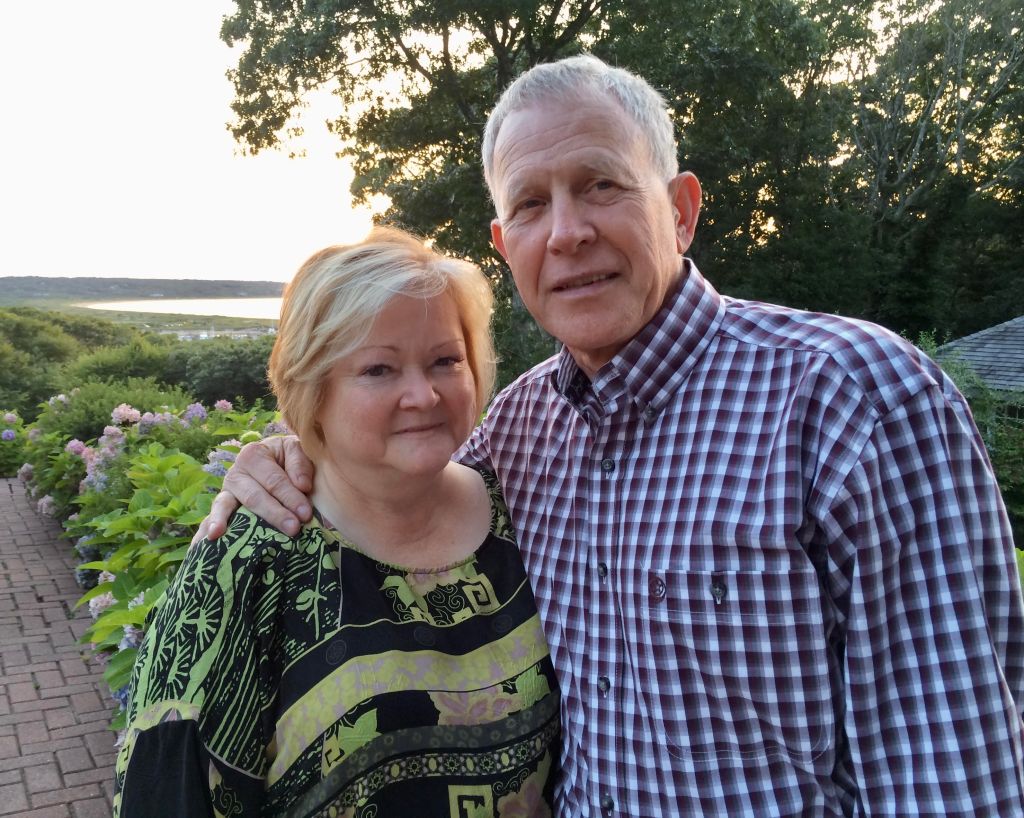
Dennis adds that he’s looking forward to the play reading’s other performers having his back for its Sydney presentation.
‘I’m pretty excited about doing it, actually. When you get to do it with professionals like they did in New York and like we’re going to have in Sydney, it’s nice to have them carry me. That’s basically what’s happening. So I look forward to that crutch to help me make it through that small part that I have to play,’ he says.
Law is already prepared for that moment to be devastating. ‘The speech that Dennis gave in a Wyoming courtroom 25 years ago now, he’s going to deliver that again, and I’m not really sure I’m emotionally prepared for what that’s going to feel like.
‘And what’s so powerful is that you know it really happened – and then to share that with us and to actually go into something that is so powerful, but obviously so mired in pain, I think is a real act of generosity,’ Law continues.
Bryant is similarly prepared to be moved by Dennis Shepard’s participation in the production.
‘Often we’re all moved by the things we be expect to be moved by: death, loss. But I think the thing that moves me most often as a human is incredible generosity – and the generosity in the speech that Dennis gave and will give… Look, we live in a culture that is so angry so often. People are so angry. You hear so much anger, and it’s understandable. People are furious and they rail and they’re looking for someone to blame. And we get that. Like, that is so easy for us as humans to understand that we don’t even think twice about it, because of course people feel that way,’ Bryant says.
‘What makes me think twice is when someone like Dennis Shepard can be feeling all of that and offer grace instead – offer the gift of life back to someone. That shocks me because it reminds me that humans are capable of so much good, when often we’re just surrounded by how bad we can be,’ he explains.
When asked about the challenge of directing Dennis Shepard in his delivery of his court statement, Bryant replies: ‘For me as a theatre-maker, and God, just as a human, the thought of Dennis, all these years later, still being courageous enough to put himself back in the state of mind that he would have been at the end of the court case? I think that is just thrilling: someone who’s so willing to offer that up to the world.
‘And because of the cast involved – and I’ve worked with them all, they’re incredible actors – I don’t feel overly concerned about that. I think if you cast humanistic people to tell a humanistic story, you’re going to be very well ahead,’ he tells ArtsHub.
Honouring Matt Shepard’s legacy
As previously noted, the Sydney reading of The Laramie Project is being supported by The Matthew Shepard Foundation, which Judy and Dennis Shepard established after their son’s death.
‘We started it on Matt’s birthday in 1998, 1 December, six weeks after he passed,’ Judy says. ‘People had begun to send us cards and letters and also money to pay the hospital bill, but we didn’t want to use it for that. So we thought we would start this organisation to help Matt’s friends and his peers maybe have a safer, more informed future. We certainly didn’t think it was going to last this long.’
Twenty-six years after Matt’s death, the Foundation continues to fight for social justice through a range of initiatives, with a particular focus on education and countering hate.
‘We have resources to help schools, and Dennis and I speak at and employ resource groups at schools. We also work with the FBI and their training courses,’ Judy says, with Dennis adding, ‘a lot of law enforcement.’
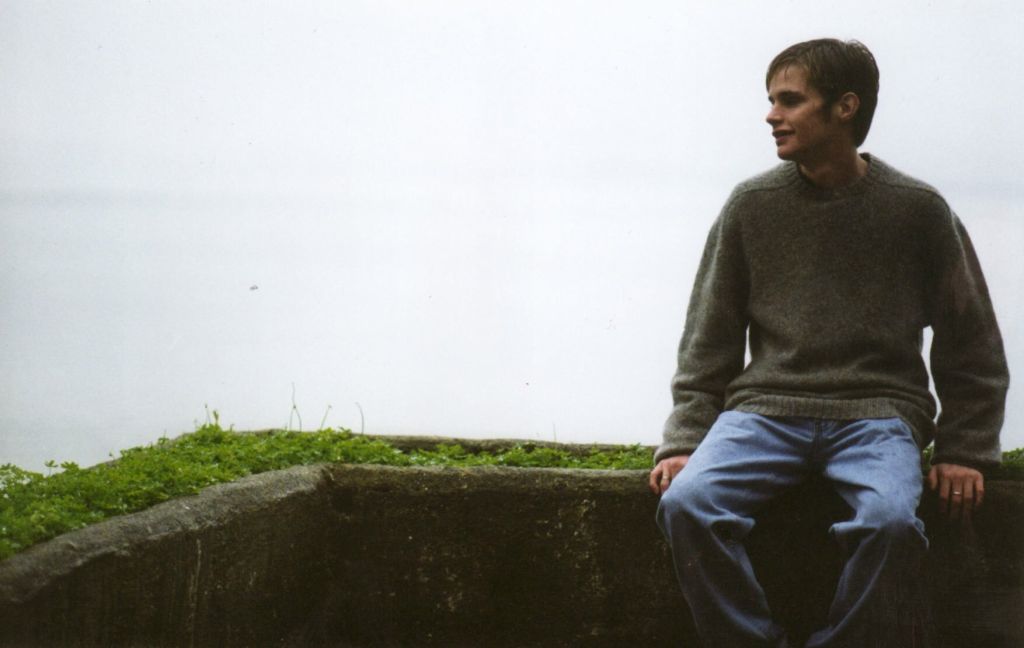
And while the Foundation cannot endorse political candidates and must remain non-political as well as not-for-profit, Judy and Dennis themselves are free to lobby politicians as they wish, and do so frequently.
‘So we have lobbied in state legislatures for policy against anti-trans legislation, also against the gay panic defence. So we can do that. Politically, Dennis and I can do whatever we want and, believe me, we do, but the Foundation just has to stay that little bit removed from endorsing candidates,’ Judy says.
The Foundation has also supported a variety of performances and publications, including an oratorio about their son and two books by US writer and editor Lesléa Newman, the author of Heather Has Two Mommies, who Judy calls ‘a wonderful storyteller’.
‘She has two books about Matt, one called October Mourning and one called Always Matt,’ Judy continues, with Dennis adding, ‘and which just came out.’
Judy adds: ‘She’s a wonderful, wonderful writer, very prolific and has a personal connection to the story, and we also have resources to help promote her work.’
Why ‘The Laramie Project’ still matters
Given that it has been 26 years since Matt Shepard was murdered, the Sydney staging of The Laramie Project may well bring his story to the attention of an entirely new generation of young LGBTQI+ people, some of whom may only just be discovering the case’s painful facts for the first time.
Law notes that while we all have things to learn about history and queer history, ‘The last thing I would want to present The Laramie Project as in this staged reading would be as something that happened so long ago that we don’t have to think about it anymore.
‘If Matthew’s father is going to be in the room, it’s the last thing from being a museum piece. We, he and so many other people carry the legacy of Matthew Shepard’s death, just as so many people carry the legacy of the other deaths and injuries of people who have been the victims of hate crimes. It’s not over.
‘Yes, I think it’s an opportunity for queer people to learn about our history,’ Law continues, ‘but also it’s an invitation for queer people to ask, “What else do we not know?” What else do we not know about the current state of queer people working in religious institutions, of queer people facing gay conversion therapies, of young and older trans people and the discriminations and stigmas that they face? What are our blind spots? That something like this could happen to Matthew Shepard was a blind spot for so many for so long. What are our current day blind spots and who’s at risk now?’
The importance and ongoing relevance of The Laramie Project is something Judy Shepard says she ‘hates, because those things are still happening in the US – and around the world, obviously’.
‘But I also love the idea that people can learn from it,’ she adds. ‘It’s not as important that they remember that it’s about Matt, but that they remember the incident and that they learn from the incident. We understand that if you remove Matt and his sexuality from the play and insert race or religion, it’s the same exact story. It’s about ignorance and hate and violence.’
She adds: ‘If Matt had been a young man of colour instead of a blonde-haired, blue-eyed, white kid, would the story have stuck? I don’t know. I don’t know. I just want people to learn from the incident. The fact that it happened to Matt to me is not as important as remembering the work that came after, and the way people tried to change after.’
The final word goes to Dennis Shepard as he talks about the ways lasting change is achieved. ‘Change comes about by talking about it, emphasising it, publicising it and voting to make the changes. You don’t have to tolerate people. You don’t have to accept them. But you do have to respect everybody. And that’s the important thing.’
The staged reading of The Laramie Project will take place at City Recital Hall, Sydney, on Tuesday 14 May 2024 at 7:30pm. All proceeds go to the Tectonic Theater Project Playwriting Scholarship for an Australian LGBTQIA+ playwright and the Matthew Shepard Foundation.
The Tectonic Theater Project Playwriting Scholarship will allow a LGBTQIA+ Australian playwright to embark on a two-week creative development experience in New York City, which includes US$10,000 for a commission fee and to assist with living expenses while observing training at Tectonic Theater Project’s Moment Work Institute.
Applications open at 9am AEST on Friday 17 May 2024.
